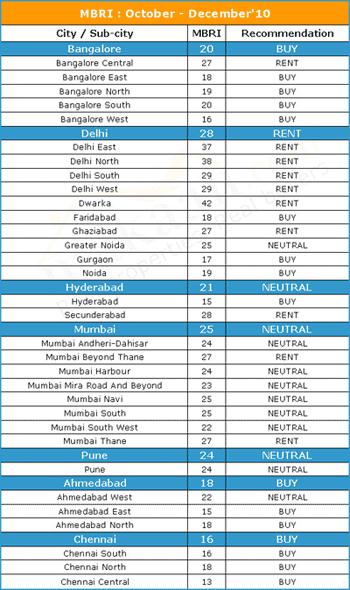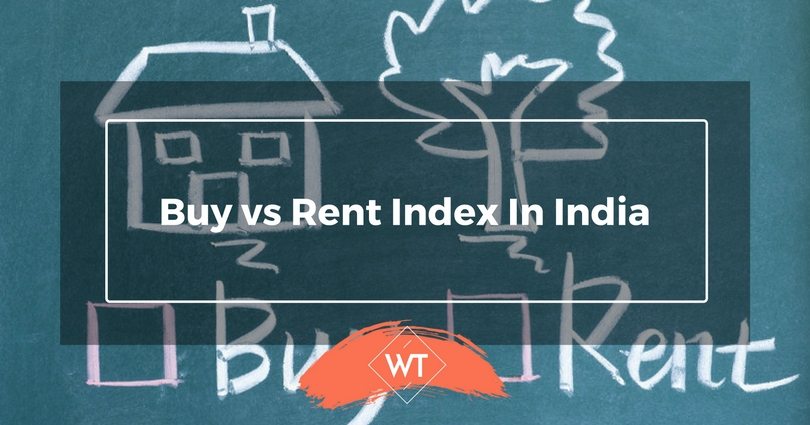Buy vs Rent Index in India

Buy vs Rent? That is a touch choice. Today many young professionals are looking a property investment as a good option to save on rents as well as build an asset which will help them have a safe roof/shelter for a long term. However, in many instances buying property may not be the only solution, because renting might be cheaper or work financially better off. Buying vs. Renting is a key decision that many people face.
Buy vs Rent
For example Hariharan who was earlier based in Kerala and relocated to Bangalore a few years ago. He was asking a friend “Should I buy a property or continue to live in a rented accommodation?” His friend asks him about his total budget and Hariharan says it is around Rs.30 lakhs (maximum).
Based on this limit the friend recommends a few locations to consider. But still his friend says that if the price is not affordable Hariharan could stay on rent in affordable localities.
One way to decide whether to buy or rent (buy vs rent) is to work out a cash flow analysis and find out which is a better option. The factors to take in to account would include regular cash inflow or outflows in rent and buy scenarios. In case of renting the cash outflow would be the monthly rental payments.
In case of buying the cash outflow would be the EMI, while cash inflows would be savings on rents (assuming you occupy the same house) and savings on tax on account of taking a housing loan. In addition to these you can also factor in the increase in property prices.
Does this sound simple? Even if you can understand this, it cannot capture future events or projections 100% because your rental outflows (if you stay on rent) keeps increasing, and relocations can force you to move to expensive areas with higher rents. So this is not as easy as it sounds, but still can work well.
Makaan’s Buy vs Rent Index
Most of us don’t have a reliable tool or sufficient data to analyze property prices and rents. So if there was an indicator (such as Nifty for equity markets) to decide on Buying or Renting decision it would make our life simpler.
This is what Makaan’s Buy vs. Rent Index launched recently tries to achieve. The index known as Makaan.com Buy Vs. Rent Index (MBRI) aims to help property seekers make informed choice between buying and renting in different Indian cities or towns. This also covers different regions of a city.
What is MBRI?
It is a numerical value just like any other index, which is arrived at after taking in to account various factors such as
- Average capital value of property
- Average Rental Value
- Rental Yield
- Historical Price movement
- Historical rental movement and
- Inflation
Low MBRI: Indicates it is less expensive to buy than rent.
High MBRI: Indicates it is more expensive to buy than rent.
MBRI Methodology
(Source: Makaan.com)

• Area Coverage: Each city is divided in to sub-cities or micro-markets. Prices of properties in these locations available on Makaan.com listings and with Makaan.com’s sales force is updated regularly. Cities such as Ahmedabad, Bangalore, Chennai, Delhi-NCR, Hyderabad, Mumbai, and Pune. More cities will be added in the future.
• Database: The index is based on data across 32 micro-markets and a minimum database of 20,000 data points every month.
• New & Resale Properties: The index covers a broad representation of both new and resale properties. Most data sources cover newer developments but sale of older properties and resale is not available.
• Index Algorithm: The index is calculated quarter on quarter for the respective cities and sub-cities based on an advanced algorithm, which takes in to account the average value of properties available for sale or rent.
The debate or analysis of the methodology is beyond the scope of this article. Do you really want to know the nitty gritty of how Nifty 50 index is calculated and maintained? No not really. Lets get quickly moving on to know how to interpret MBRI as shown below. Please see the MBRI for December 2010 shown on the right. (Courtesy: Makaan.com)
How to interpret MBRI?
The table below shows how MBRI should be interpreted.
| MBRI | What it Denotes | Explanation |
| 1-20 | Buy | It is less expensive to buy than stay on rent |
| 21-25 | Buy/Rent | It is relatively more expensive to buy than stay on rent. This is a middle path where one can Buy/Rent depending on their financial situation |
| 25+ | Rent | It is significantly more expensive to buy than stay on rent. |
To put it in simple terms, it is advisable to rent when index is above 25, while its good to buy when index is below 20. Between 21 and 25 one has to take a decision based on budget, income and other financial factors.
The Index aids Decision Making
An index or benchmark is only an indicator of broad trends which would be an average of various parameters. For instance Sensex represents the equity market, but is just made up of 30 stocks which serve as the barometer of markets. Hence, solely basing your decisions based on one indicator is not advisable.
This is true for MBRI index as well. You can use MBRI as one of the factors to decide whether to buy vs. rent, but need to do further research, because there can be a few good properties available in attractive locations within a sub-city or micro market.
For instance within the eastern suburbs of Bangalore in Whitefield property prices have moved north, however there are few pockets where one can still find good affordable buys within Rs.30 lakhs for a 2 BHK.
Buy vs Rent – final words
The MBRI index is definitely a useful tool that can provide a quick snapshot on buy vs rent. This can save time and energy for individuals who may have to otherwise do a lot of leg work meeting agents, developers, sellers, etc.
Once you find that the index indicates a buy you must focus on the location and do further research to find the best feasible options. Instead of focusing on 4-5 locations around a city you can pick one or two locations recommended by the index.
This is definitely a good initiative by a real estate portal to provide a quick easy to use indicator for common people to take decisions. In future we could see more such initiatives from other players such as Magic Bricks or 99acres.com as well as plans by Government to have a construction or real estate index for the country as a whole.
This can also help economists and decisions makers to create policies and initiatives to develop and provide support to construction and other ancillary industries, which will further propel the economy to greater heights.









Leave a Reply